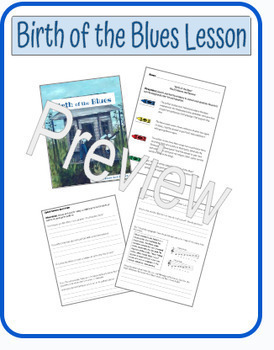"Birth of the Blues" Informational Reading Passage and Virtual Field trip
Blooming in Mississippi
3 Followers
Grade Levels
3rd - 6th
Resource Type
Standards
CCSSRL.3.5
CCSSRL.3.9
CCSSRL.3.10
CCSSRL.4.5
CCSSRL.4.9
Formats Included
- Google Slides™
Blooming in Mississippi
3 Followers

Made for Google Drive™
This resource can be used by students on Google Drive or Google Classroom. To access this resource, you’ll need to allow TPT to add it to your Google Drive. See our FAQ and Privacy Policy for more information.
Description
Explore the History of the Blues through this highly engaging lesson. Journey back in time and discover the origins of Blues Music. Your students will enjoy multimedia videos, read highly engaging text, answer standards-based comprehension questions, access an online learning game, and participate in a virtual field trip to where the Blues began.
Resource includes: Multi-media videos to engage learners and build background knowledge, informational reading passage, standards based comprehension questions, including extended practice on RI.4.8 Evidence and Reasons, a virtual field trip to W.C. Handy's Birthplace, teacher slideshow, and student packet.
If you love this resource, please check out my Blues Unit!
Total Pages
Answer Key
N/A
Teaching Duration
N/A
Report this resource to TPT
Reported resources will be reviewed by our team. Report this resource to let us know if this resource violates TPT’s content guidelines.
Standards
to see state-specific standards (only available in the US).
CCSSRL.3.5
Refer to parts of stories, dramas, and poems when writing or speaking about a text, using terms such as chapter, scene, and stanza; describe how each successive part builds on earlier sections.
CCSSRL.3.9
Compare and contrast the themes, settings, and plots of stories written by the same author about the same or similar characters (e.g., in books from a series).
CCSSRL.3.10
By the end of the year, read and comprehend literature, including stories, dramas, and poetry, at the high end of the grades 2–3 text complexity band independently and proficiently.
CCSSRL.4.5
Explain major differences between poems, drama, and prose, and refer to the structural elements of poems (e.g., verse, rhythm, meter) and drama (e.g., casts of characters, settings, descriptions, dialogue, stage directions) when writing or speaking about a text.
CCSSRL.4.9
Compare and contrast the treatment of similar themes and topics (e.g., opposition of good and evil) and patterns of events (e.g., the quest) in stories, myths, and traditional literature from different cultures.




